Emotional Intelligence Plan for Early Childhood Professionals
VerifiedAdded on 2023/06/12
|8
|1567
|65
AI Summary
This report explores the role of emotional intelligence in early childhood professional teaching and how it can be used to improve the emotional experiences of children. It discusses the main elements of emotional intelligence, including social awareness, self-awareness, self-management, and relationship management. The report focuses on relationship management as a key factor in improving emotional intelligence and provides a SMART action plan for developing listening and communication skills.
Contribute Materials
Your contribution can guide someone’s learning journey. Share your
documents today.
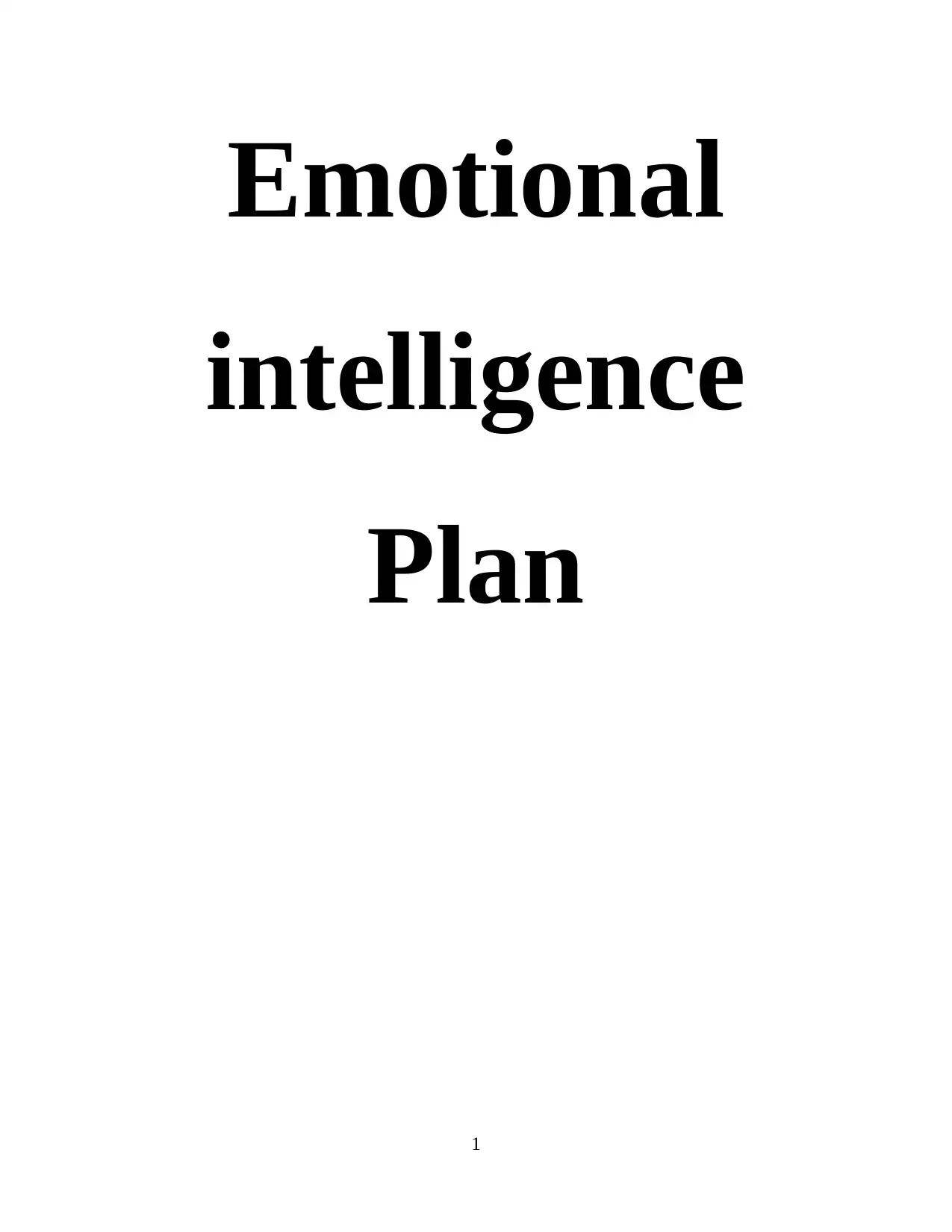
Emotional
intelligence
Plan
1
intelligence
Plan
1
Secure Best Marks with AI Grader
Need help grading? Try our AI Grader for instant feedback on your assignments.
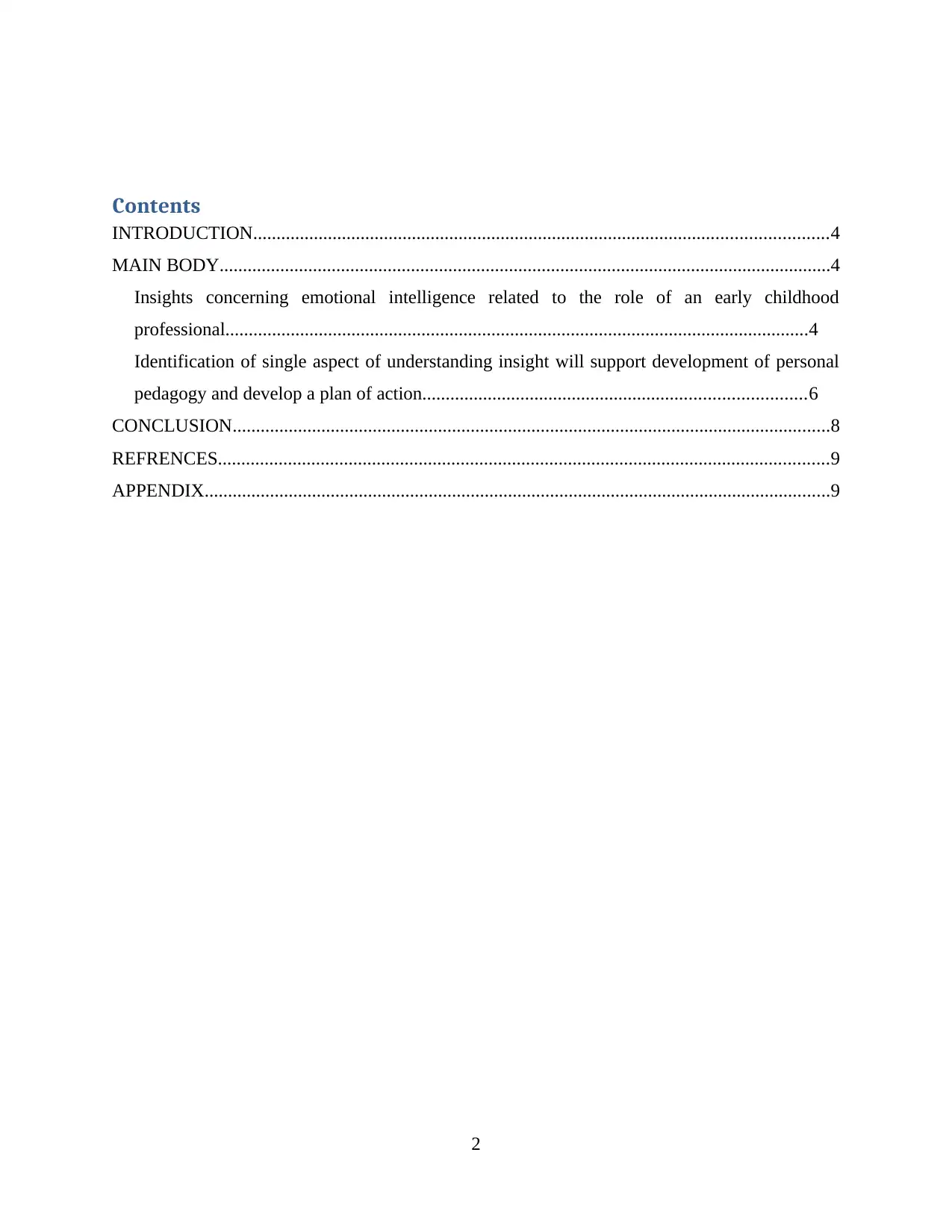
Contents
INTRODUCTION...........................................................................................................................4
MAIN BODY...................................................................................................................................4
Insights concerning emotional intelligence related to the role of an early childhood
professional.............................................................................................................................4
Identification of single aspect of understanding insight will support development of personal
pedagogy and develop a plan of action..................................................................................6
CONCLUSION................................................................................................................................8
REFRENCES...................................................................................................................................9
APPENDIX......................................................................................................................................9
2
INTRODUCTION...........................................................................................................................4
MAIN BODY...................................................................................................................................4
Insights concerning emotional intelligence related to the role of an early childhood
professional.............................................................................................................................4
Identification of single aspect of understanding insight will support development of personal
pedagogy and develop a plan of action..................................................................................6
CONCLUSION................................................................................................................................8
REFRENCES...................................................................................................................................9
APPENDIX......................................................................................................................................9
2
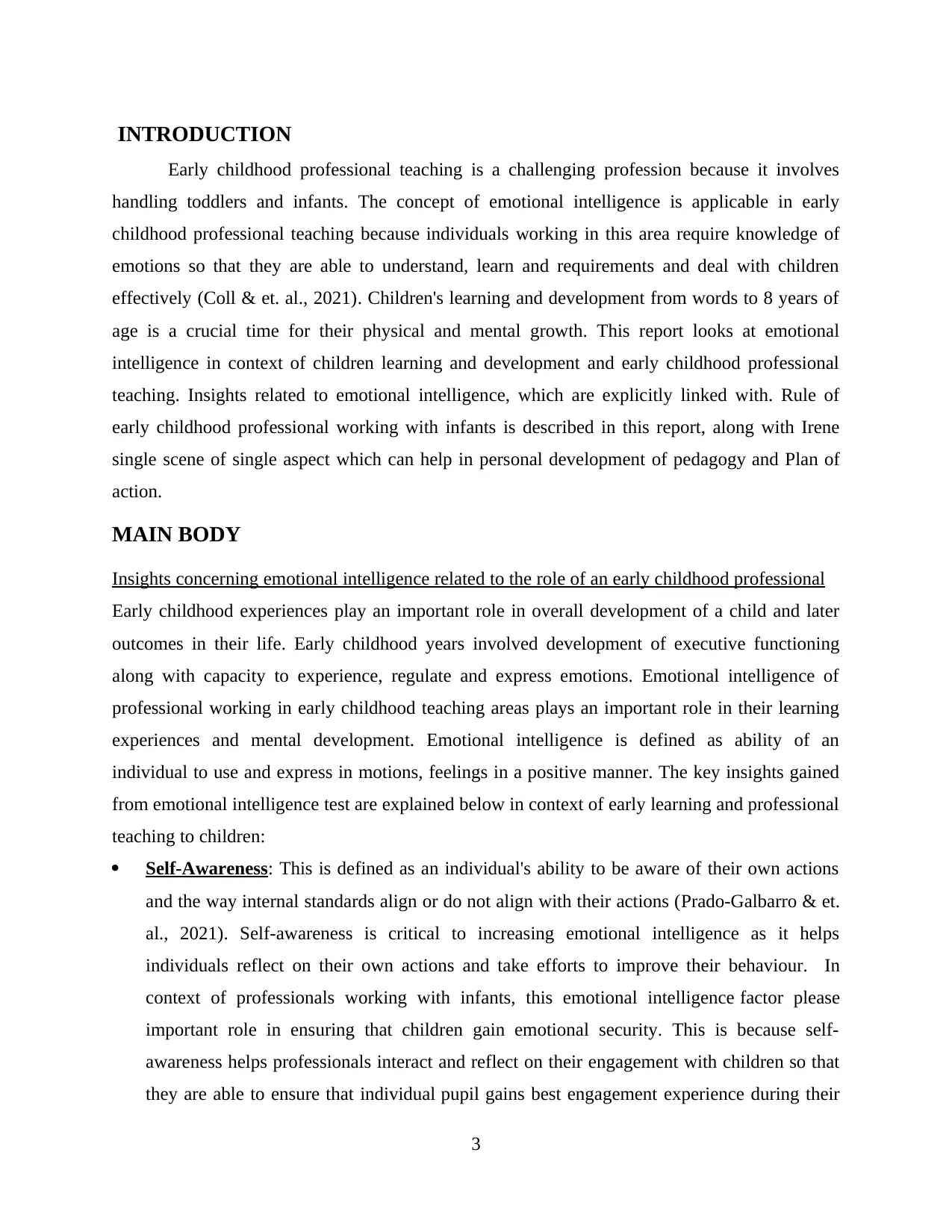
INTRODUCTION
Early childhood professional teaching is a challenging profession because it involves
handling toddlers and infants. The concept of emotional intelligence is applicable in early
childhood professional teaching because individuals working in this area require knowledge of
emotions so that they are able to understand, learn and requirements and deal with children
effectively (Coll & et. al., 2021). Children's learning and development from words to 8 years of
age is a crucial time for their physical and mental growth. This report looks at emotional
intelligence in context of children learning and development and early childhood professional
teaching. Insights related to emotional intelligence, which are explicitly linked with. Rule of
early childhood professional working with infants is described in this report, along with Irene
single scene of single aspect which can help in personal development of pedagogy and Plan of
action.
MAIN BODY
Insights concerning emotional intelligence related to the role of an early childhood professional
Early childhood experiences play an important role in overall development of a child and later
outcomes in their life. Early childhood years involved development of executive functioning
along with capacity to experience, regulate and express emotions. Emotional intelligence of
professional working in early childhood teaching areas plays an important role in their learning
experiences and mental development. Emotional intelligence is defined as ability of an
individual to use and express in motions, feelings in a positive manner. The key insights gained
from emotional intelligence test are explained below in context of early learning and professional
teaching to children:
Self-Awareness: This is defined as an individual's ability to be aware of their own actions
and the way internal standards align or do not align with their actions (Prado-Galbarro & et.
al., 2021). Self-awareness is critical to increasing emotional intelligence as it helps
individuals reflect on their own actions and take efforts to improve their behaviour. In
context of professionals working with infants, this emotional intelligence factor please
important role in ensuring that children gain emotional security. This is because self-
awareness helps professionals interact and reflect on their engagement with children so that
they are able to ensure that individual pupil gains best engagement experience during their
3
Early childhood professional teaching is a challenging profession because it involves
handling toddlers and infants. The concept of emotional intelligence is applicable in early
childhood professional teaching because individuals working in this area require knowledge of
emotions so that they are able to understand, learn and requirements and deal with children
effectively (Coll & et. al., 2021). Children's learning and development from words to 8 years of
age is a crucial time for their physical and mental growth. This report looks at emotional
intelligence in context of children learning and development and early childhood professional
teaching. Insights related to emotional intelligence, which are explicitly linked with. Rule of
early childhood professional working with infants is described in this report, along with Irene
single scene of single aspect which can help in personal development of pedagogy and Plan of
action.
MAIN BODY
Insights concerning emotional intelligence related to the role of an early childhood professional
Early childhood experiences play an important role in overall development of a child and later
outcomes in their life. Early childhood years involved development of executive functioning
along with capacity to experience, regulate and express emotions. Emotional intelligence of
professional working in early childhood teaching areas plays an important role in their learning
experiences and mental development. Emotional intelligence is defined as ability of an
individual to use and express in motions, feelings in a positive manner. The key insights gained
from emotional intelligence test are explained below in context of early learning and professional
teaching to children:
Self-Awareness: This is defined as an individual's ability to be aware of their own actions
and the way internal standards align or do not align with their actions (Prado-Galbarro & et.
al., 2021). Self-awareness is critical to increasing emotional intelligence as it helps
individuals reflect on their own actions and take efforts to improve their behaviour. In
context of professionals working with infants, this emotional intelligence factor please
important role in ensuring that children gain emotional security. This is because self-
awareness helps professionals interact and reflect on their engagement with children so that
they are able to ensure that individual pupil gains best engagement experience during their
3
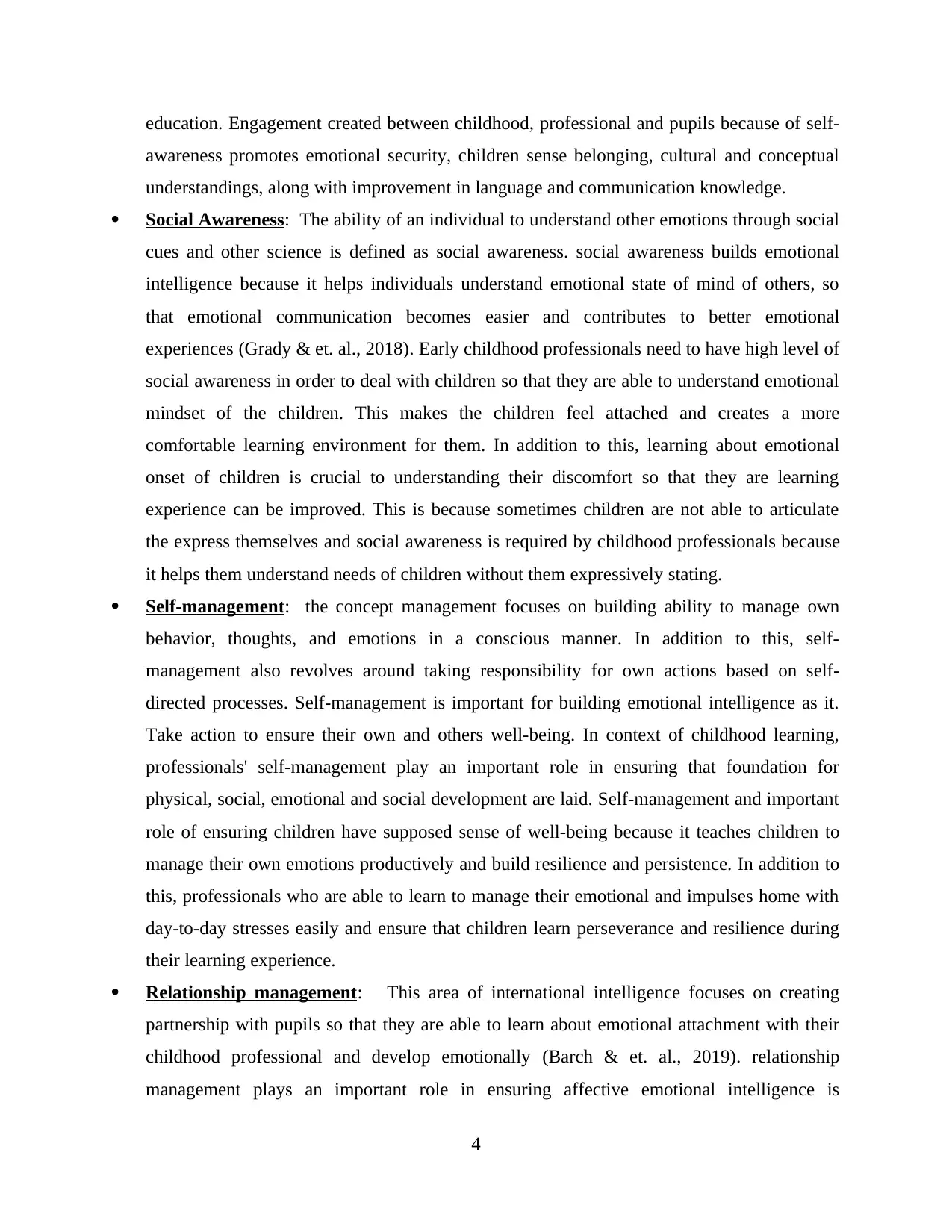
education. Engagement created between childhood, professional and pupils because of self-
awareness promotes emotional security, children sense belonging, cultural and conceptual
understandings, along with improvement in language and communication knowledge.
Social Awareness: The ability of an individual to understand other emotions through social
cues and other science is defined as social awareness. social awareness builds emotional
intelligence because it helps individuals understand emotional state of mind of others, so
that emotional communication becomes easier and contributes to better emotional
experiences (Grady & et. al., 2018). Early childhood professionals need to have high level of
social awareness in order to deal with children so that they are able to understand emotional
mindset of the children. This makes the children feel attached and creates a more
comfortable learning environment for them. In addition to this, learning about emotional
onset of children is crucial to understanding their discomfort so that they are learning
experience can be improved. This is because sometimes children are not able to articulate
the express themselves and social awareness is required by childhood professionals because
it helps them understand needs of children without them expressively stating.
Self-management: the concept management focuses on building ability to manage own
behavior, thoughts, and emotions in a conscious manner. In addition to this, self-
management also revolves around taking responsibility for own actions based on self-
directed processes. Self-management is important for building emotional intelligence as it.
Take action to ensure their own and others well-being. In context of childhood learning,
professionals' self-management play an important role in ensuring that foundation for
physical, social, emotional and social development are laid. Self-management and important
role of ensuring children have supposed sense of well-being because it teaches children to
manage their own emotions productively and build resilience and persistence. In addition to
this, professionals who are able to learn to manage their emotional and impulses home with
day-to-day stresses easily and ensure that children learn perseverance and resilience during
their learning experience.
Relationship management: This area of international intelligence focuses on creating
partnership with pupils so that they are able to learn about emotional attachment with their
childhood professional and develop emotionally (Barch & et. al., 2019). relationship
management plays an important role in ensuring affective emotional intelligence is
4
awareness promotes emotional security, children sense belonging, cultural and conceptual
understandings, along with improvement in language and communication knowledge.
Social Awareness: The ability of an individual to understand other emotions through social
cues and other science is defined as social awareness. social awareness builds emotional
intelligence because it helps individuals understand emotional state of mind of others, so
that emotional communication becomes easier and contributes to better emotional
experiences (Grady & et. al., 2018). Early childhood professionals need to have high level of
social awareness in order to deal with children so that they are able to understand emotional
mindset of the children. This makes the children feel attached and creates a more
comfortable learning environment for them. In addition to this, learning about emotional
onset of children is crucial to understanding their discomfort so that they are learning
experience can be improved. This is because sometimes children are not able to articulate
the express themselves and social awareness is required by childhood professionals because
it helps them understand needs of children without them expressively stating.
Self-management: the concept management focuses on building ability to manage own
behavior, thoughts, and emotions in a conscious manner. In addition to this, self-
management also revolves around taking responsibility for own actions based on self-
directed processes. Self-management is important for building emotional intelligence as it.
Take action to ensure their own and others well-being. In context of childhood learning,
professionals' self-management play an important role in ensuring that foundation for
physical, social, emotional and social development are laid. Self-management and important
role of ensuring children have supposed sense of well-being because it teaches children to
manage their own emotions productively and build resilience and persistence. In addition to
this, professionals who are able to learn to manage their emotional and impulses home with
day-to-day stresses easily and ensure that children learn perseverance and resilience during
their learning experience.
Relationship management: This area of international intelligence focuses on creating
partnership with pupils so that they are able to learn about emotional attachment with their
childhood professional and develop emotionally (Barch & et. al., 2019). relationship
management plays an important role in ensuring affective emotional intelligence is
4
Secure Best Marks with AI Grader
Need help grading? Try our AI Grader for instant feedback on your assignments.
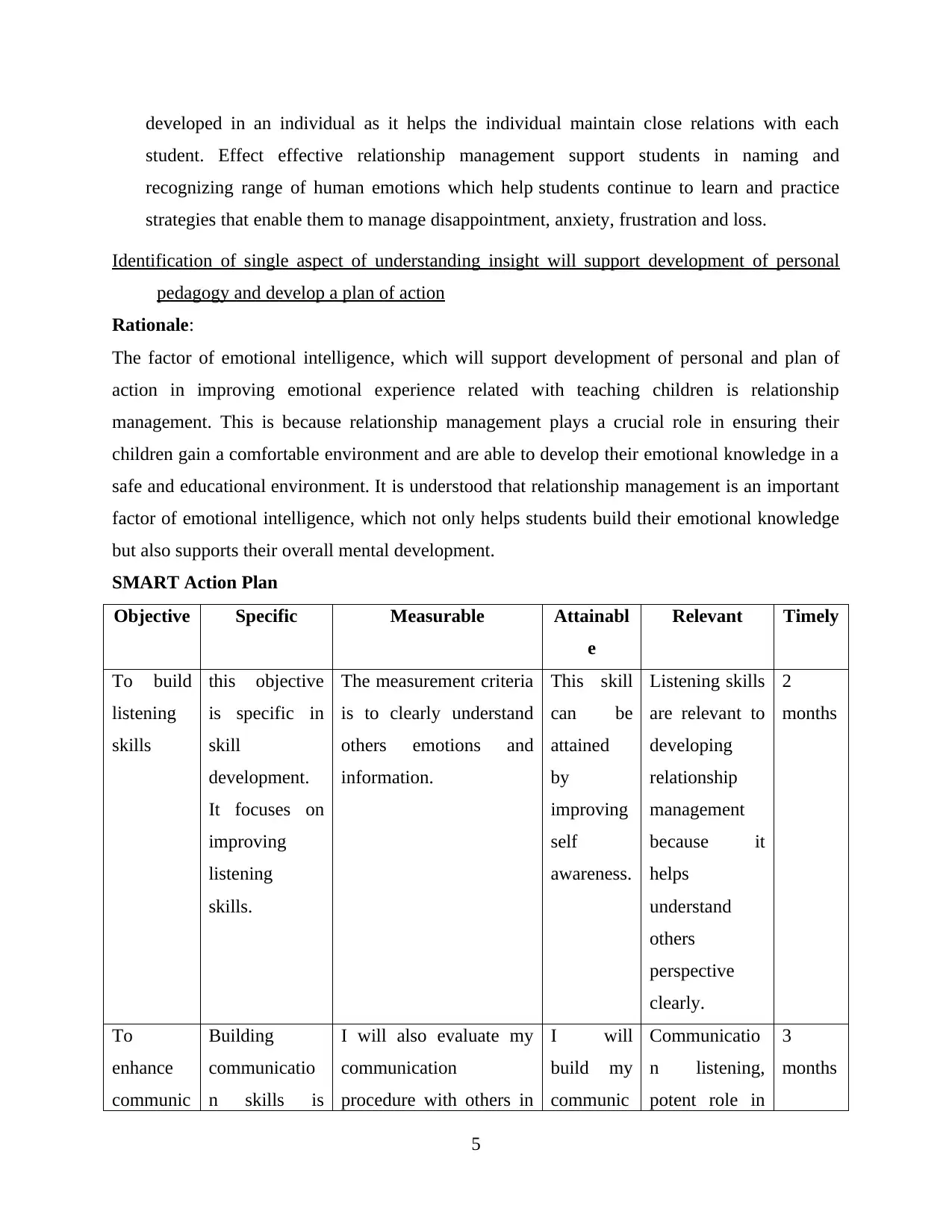
developed in an individual as it helps the individual maintain close relations with each
student. Effect effective relationship management support students in naming and
recognizing range of human emotions which help students continue to learn and practice
strategies that enable them to manage disappointment, anxiety, frustration and loss.
Identification of single aspect of understanding insight will support development of personal
pedagogy and develop a plan of action
Rationale:
The factor of emotional intelligence, which will support development of personal and plan of
action in improving emotional experience related with teaching children is relationship
management. This is because relationship management plays a crucial role in ensuring their
children gain a comfortable environment and are able to develop their emotional knowledge in a
safe and educational environment. It is understood that relationship management is an important
factor of emotional intelligence, which not only helps students build their emotional knowledge
but also supports their overall mental development.
SMART Action Plan
Objective Specific Measurable Attainabl
e
Relevant Timely
To build
listening
skills
this objective
is specific in
skill
development.
It focuses on
improving
listening
skills.
The measurement criteria
is to clearly understand
others emotions and
information.
This skill
can be
attained
by
improving
self
awareness.
Listening skills
are relevant to
developing
relationship
management
because it
helps
understand
others
perspective
clearly.
2
months
To
enhance
communic
Building
communicatio
n skills is
I will also evaluate my
communication
procedure with others in
I will
build my
communic
Communicatio
n listening,
potent role in
3
months
5
student. Effect effective relationship management support students in naming and
recognizing range of human emotions which help students continue to learn and practice
strategies that enable them to manage disappointment, anxiety, frustration and loss.
Identification of single aspect of understanding insight will support development of personal
pedagogy and develop a plan of action
Rationale:
The factor of emotional intelligence, which will support development of personal and plan of
action in improving emotional experience related with teaching children is relationship
management. This is because relationship management plays a crucial role in ensuring their
children gain a comfortable environment and are able to develop their emotional knowledge in a
safe and educational environment. It is understood that relationship management is an important
factor of emotional intelligence, which not only helps students build their emotional knowledge
but also supports their overall mental development.
SMART Action Plan
Objective Specific Measurable Attainabl
e
Relevant Timely
To build
listening
skills
this objective
is specific in
skill
development.
It focuses on
improving
listening
skills.
The measurement criteria
is to clearly understand
others emotions and
information.
This skill
can be
attained
by
improving
self
awareness.
Listening skills
are relevant to
developing
relationship
management
because it
helps
understand
others
perspective
clearly.
2
months
To
enhance
communic
Building
communicatio
n skills is
I will also evaluate my
communication
procedure with others in
I will
build my
communic
Communicatio
n listening,
potent role in
3
months
5
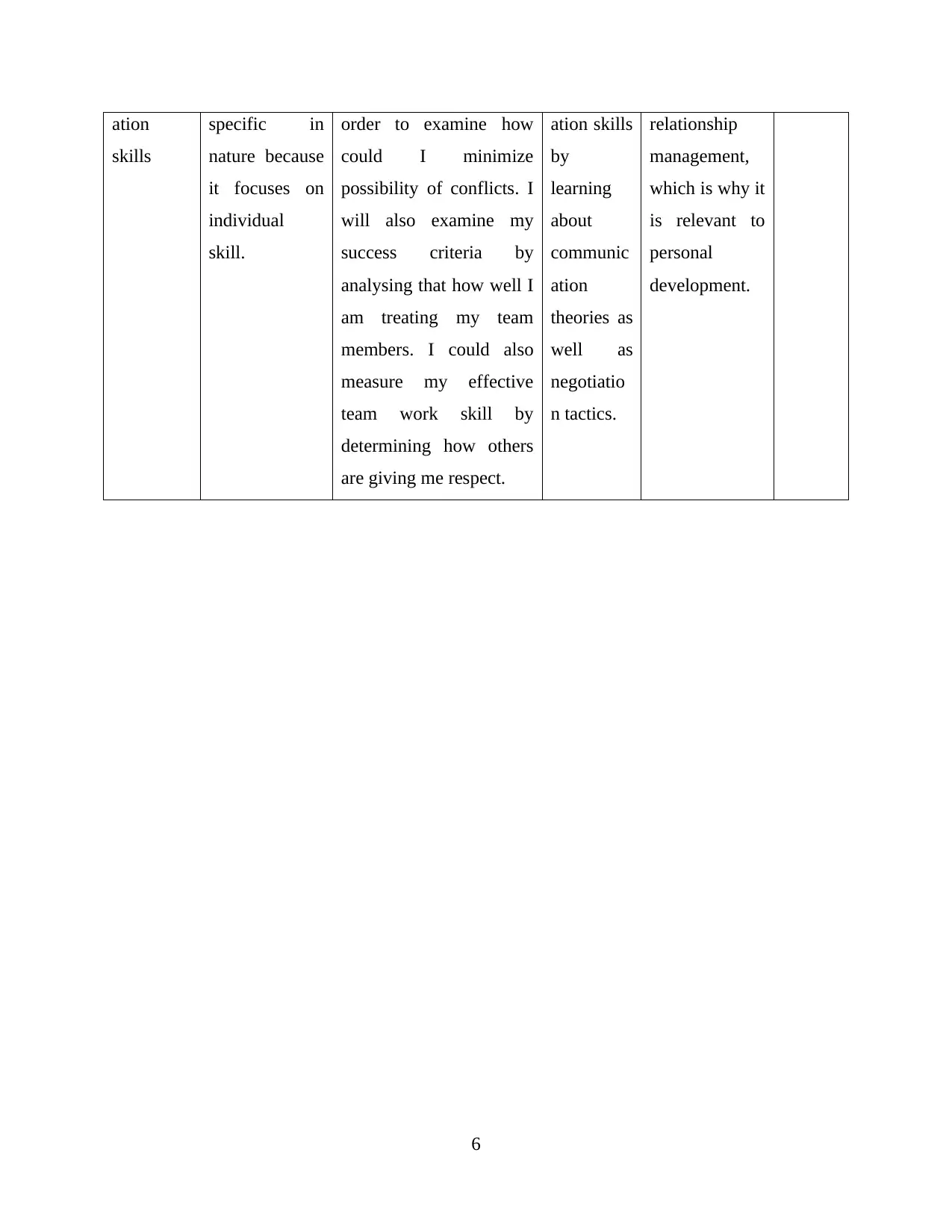
ation
skills
specific in
nature because
it focuses on
individual
skill.
order to examine how
could I minimize
possibility of conflicts. I
will also examine my
success criteria by
analysing that how well I
am treating my team
members. I could also
measure my effective
team work skill by
determining how others
are giving me respect.
ation skills
by
learning
about
communic
ation
theories as
well as
negotiatio
n tactics.
relationship
management,
which is why it
is relevant to
personal
development.
6
skills
specific in
nature because
it focuses on
individual
skill.
order to examine how
could I minimize
possibility of conflicts. I
will also examine my
success criteria by
analysing that how well I
am treating my team
members. I could also
measure my effective
team work skill by
determining how others
are giving me respect.
ation skills
by
learning
about
communic
ation
theories as
well as
negotiatio
n tactics.
relationship
management,
which is why it
is relevant to
personal
development.
6
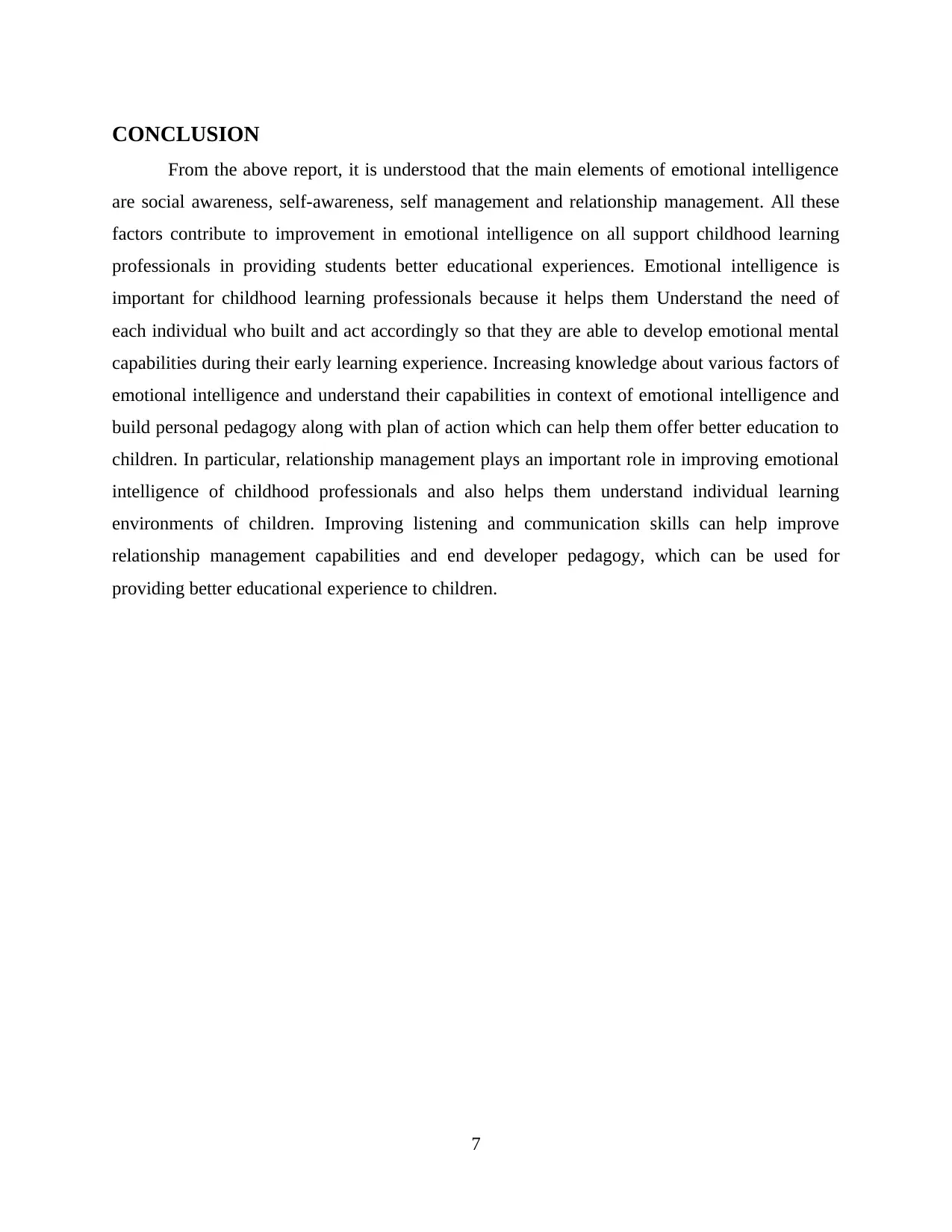
CONCLUSION
From the above report, it is understood that the main elements of emotional intelligence
are social awareness, self-awareness, self management and relationship management. All these
factors contribute to improvement in emotional intelligence on all support childhood learning
professionals in providing students better educational experiences. Emotional intelligence is
important for childhood learning professionals because it helps them Understand the need of
each individual who built and act accordingly so that they are able to develop emotional mental
capabilities during their early learning experience. Increasing knowledge about various factors of
emotional intelligence and understand their capabilities in context of emotional intelligence and
build personal pedagogy along with plan of action which can help them offer better education to
children. In particular, relationship management plays an important role in improving emotional
intelligence of childhood professionals and also helps them understand individual learning
environments of children. Improving listening and communication skills can help improve
relationship management capabilities and end developer pedagogy, which can be used for
providing better educational experience to children.
7
From the above report, it is understood that the main elements of emotional intelligence
are social awareness, self-awareness, self management and relationship management. All these
factors contribute to improvement in emotional intelligence on all support childhood learning
professionals in providing students better educational experiences. Emotional intelligence is
important for childhood learning professionals because it helps them Understand the need of
each individual who built and act accordingly so that they are able to develop emotional mental
capabilities during their early learning experience. Increasing knowledge about various factors of
emotional intelligence and understand their capabilities in context of emotional intelligence and
build personal pedagogy along with plan of action which can help them offer better education to
children. In particular, relationship management plays an important role in improving emotional
intelligence of childhood professionals and also helps them understand individual learning
environments of children. Improving listening and communication skills can help improve
relationship management capabilities and end developer pedagogy, which can be used for
providing better educational experience to children.
7
Paraphrase This Document
Need a fresh take? Get an instant paraphrase of this document with our AI Paraphraser
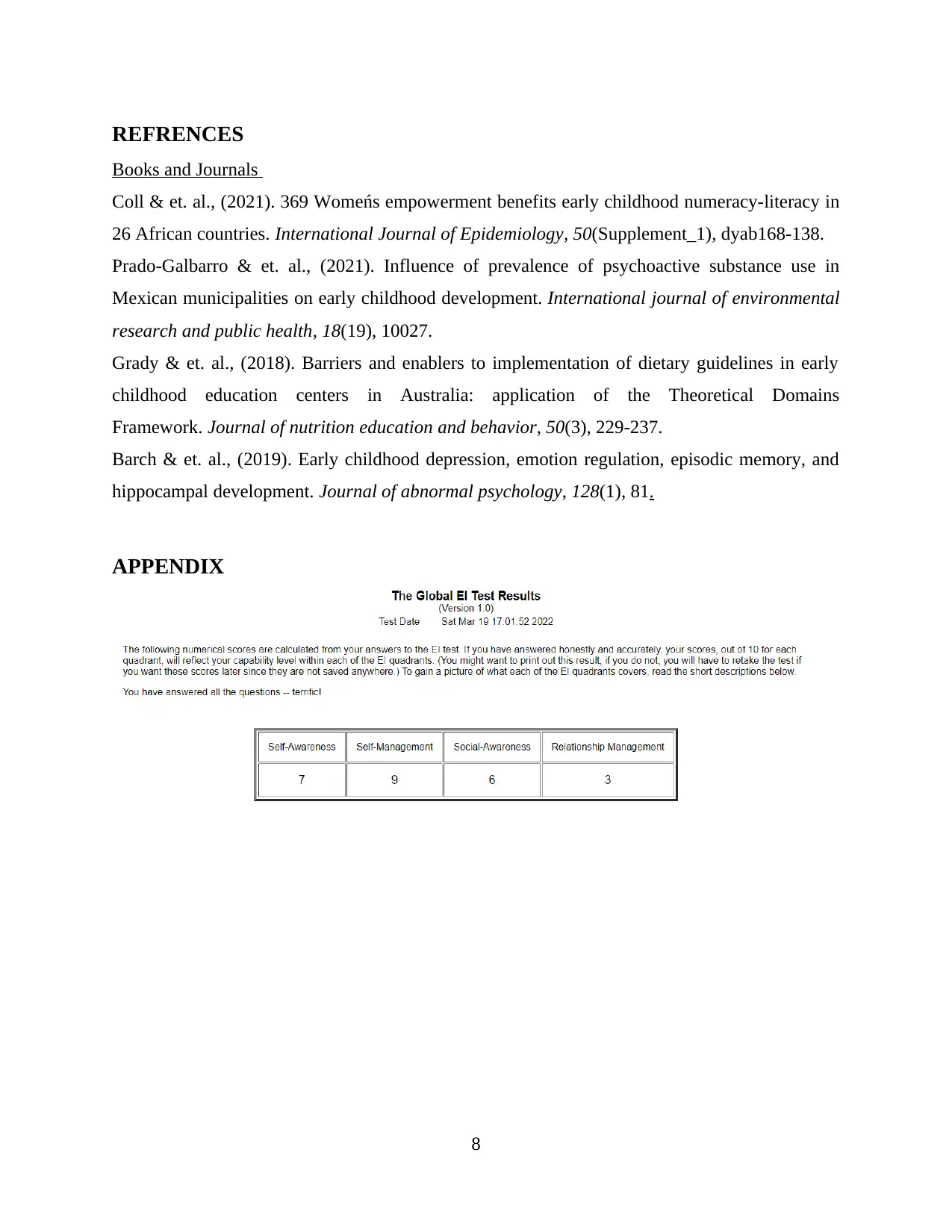
REFRENCES
Books and Journals
Coll & et. al., (2021). 369 Womeńs empowerment benefits early childhood numeracy-literacy in
26 African countries. International Journal of Epidemiology, 50(Supplement_1), dyab168-138.
Prado-Galbarro & et. al., (2021). Influence of prevalence of psychoactive substance use in
Mexican municipalities on early childhood development. International journal of environmental
research and public health, 18(19), 10027.
Grady & et. al., (2018). Barriers and enablers to implementation of dietary guidelines in early
childhood education centers in Australia: application of the Theoretical Domains
Framework. Journal of nutrition education and behavior, 50(3), 229-237.
Barch & et. al., (2019). Early childhood depression, emotion regulation, episodic memory, and
hippocampal development. Journal of abnormal psychology, 128(1), 81.
APPENDIX
8
Books and Journals
Coll & et. al., (2021). 369 Womeńs empowerment benefits early childhood numeracy-literacy in
26 African countries. International Journal of Epidemiology, 50(Supplement_1), dyab168-138.
Prado-Galbarro & et. al., (2021). Influence of prevalence of psychoactive substance use in
Mexican municipalities on early childhood development. International journal of environmental
research and public health, 18(19), 10027.
Grady & et. al., (2018). Barriers and enablers to implementation of dietary guidelines in early
childhood education centers in Australia: application of the Theoretical Domains
Framework. Journal of nutrition education and behavior, 50(3), 229-237.
Barch & et. al., (2019). Early childhood depression, emotion regulation, episodic memory, and
hippocampal development. Journal of abnormal psychology, 128(1), 81.
APPENDIX
8
1 out of 8
Related Documents
Your All-in-One AI-Powered Toolkit for Academic Success.
+13062052269
info@desklib.com
Available 24*7 on WhatsApp / Email
![[object Object]](/_next/static/media/star-bottom.7253800d.svg)
Unlock your academic potential
© 2024 | Zucol Services PVT LTD | All rights reserved.




